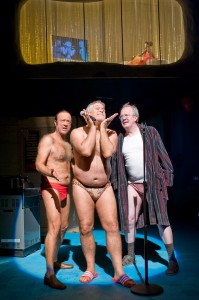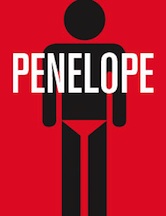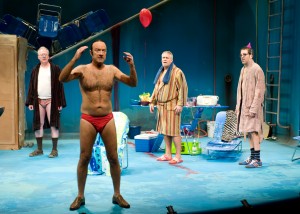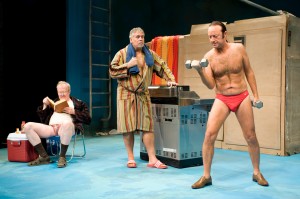SUITORS SUIT ILL-FITTING SUITS
Enda Walsh, scribe of The Walworth Farce and The New Electric Ballroom, is one of the great polarizing writers in modern theater: his admirers love the English dramatist’s quirky theatrical imagination and his command of language, while his detractors complain that his stories are improbable, if not incomprehensible, and that his scripts are bloated with excesses of luxurious but ultimately tedious verbosity. Now, the Steppenwolf Theatre is presenting Walsh’s Penelope, a 90-minute intermissionless comedy-drama that will give comfort to his fans and irritate his detractors once again.
Walsh builds his play on a portion of Homer’s ancient epic The Odyssey, in which Odysseus, king of Ithaca, is away fighting in the Trojan War. During his absence, a flock of suitors comes to his palace, laying siege to his wife Penelope to demand that she take one of them as her husband on the expectation that Odysseus will never return from the war. The suitors are a dissolute bunch and Odysseus wipes out the last of them after he returns to Ithaca in disguise.
In Penelope, four suitors remain from the 100 who started to woo Penelope years earlier, yet there is nothing of ancient Greece about them. The men gather around an empty swimming pool, wearing speed-o bikini brief swimming suits. To expand on the sense of chronological dislocation, the production injects frequent excerpts from recordings by Herb Alpert and the Tijuana Brass. The men are not physically impressive, their middle- aged bodies running to fat as they posture and bicker while pondering ways to reach Penelope and pressure her to choose a new mate before Odysseus makes his way back to Ithaca and causes all of them a lot of grief.
Penelope herself makes occasional appearances, silently observing the men from her apartment above the main stage area. She never speaks, but the four men – who all carry the highly un-Homeric names of Dunne (Scott Jaeck), Quinn (Yasen Peyankov), Fitz (Tracey Letts replacing the originally cast John Mahoney), and Burns (Ian Barford) – do enough talking for her.
Each of the four characters possesses a distinct personality: Quinn is a bullying and abrasive take-charge guy; Dunne is a pompous blowhard; Fitz is a bookish, mild mannered nerdy type; and Burns, the youngest of the four, is in a constant state of anger and unhappiness, largely because of the recent suicide of his close friend and fellow suitor, Murray.
 Spectators who don’t read the program notes before the play starts will have no idea who these men are or what their situation is until gradually they reveal their plight as desperate suitors for the aloof Penelope. There isn’t much physical action for the first two thirds of the play but plenty of speechifying, especially two interludes when first Dunne – and then Fitz – takes a microphone and launches a long monologue (televised live to Penelope’s apartment) making their case as Odysseus’s replacement. The monologues show Walsh at his best in concocting eloquent arias of language that will captivate some listeners and pass over others as so much beautiful verbal noise.
Spectators who don’t read the program notes before the play starts will have no idea who these men are or what their situation is until gradually they reveal their plight as desperate suitors for the aloof Penelope. There isn’t much physical action for the first two thirds of the play but plenty of speechifying, especially two interludes when first Dunne – and then Fitz – takes a microphone and launches a long monologue (televised live to Penelope’s apartment) making their case as Odysseus’s replacement. The monologues show Walsh at his best in concocting eloquent arias of language that will captivate some listeners and pass over others as so much beautiful verbal noise.
Near the end of the play, the characters suddenly launch into a silent manic dumb show that involves lots of quick costume changes off stage and has the frenzied quality of a Marx Brothers sketch. The audience has got to love the scene, even though some viewers may not understand where it’s coming from or where it’s going.
The sensibility of Penelope has a whiff of Samuel Beckett – that is, if Beckett was in a farcical, long-winded mood. The four characters are trapped in their situation, confined to a physical space with little hope of release, and unable to extricate themselves for all their planning.
But say this for Walsh: the man really knows how to write for his performers. Actors must love the challenge of speaking his elaborate language and interpreting his offbeat plots and bizarre characters. In Walsh’s plays, the major characters are star turns for the actors, and Penelope is no exception. Jaeck, Peyankov, Letts, and Barford all get at least one spotlighted monologue that displays Walsh’s rich, not to say opulent, language. And there is genuine humor in the banter among the four men as well as frequent moments of violent-tinged tension (one of the characters is stabbed to death on stage in a typical out-of-left-field Walsh plot twist). An actor has to be really good to perform in a Walsh play and the four men at the Steppenwolf are exceptional.
Logan Vaughn plays Penelope. She spends her few appearances elegantly seated, standing, or walking, showing only a bit of facial expression in the play’s final moments. She is an oasis of restraint and mystery among all the talk below her.
Director Amy Morton has done a splendid job of orchestrating the performances so they make their own internal sense, however perplexing the actions on stage might be for the audience. Walt Spangler’s bi-level set and James Ingalls’s lighting give the production the visual look of a slightly seedy David Hockney painting. Ana Kuzmanic designed the beachwear costumes, with their tacky bathrobes and flip-flops and swimsuits intended for much younger, more buff males. Rob Milburn and Michael Bodeen provide the sound design and original music.
Penelope, like all of Walsh’s plays, takes the viewer on a wild, improbable ride. I liked the play for its imaginative riff on classical literature and even more for allowing four gifted actors to do their thing, especially when displaying themselves in unflattering bathing attire.
photos by Michael Brosilow
Penelope
Steppenwolf Theatre
ends on February 5, 2012
for tickets, visit Steppenwolf
for more shows, visit Theatre in Chicago



